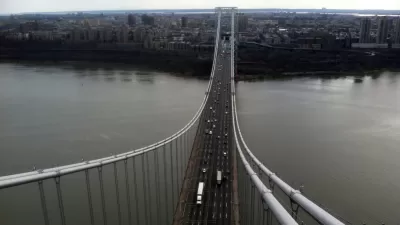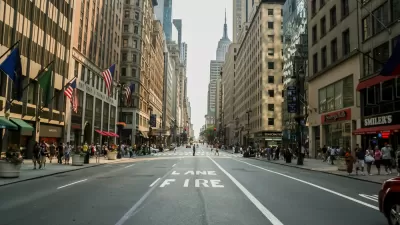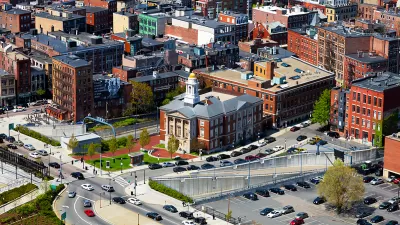Cordon pricing applied to Manhattan's Central Business District, approved by the state legislature on March 31 and signed into law by Gov. Andrew Cuomo on April 1, has the ability to be a game changer for other cities considering similar programs.

"Congestion Pricing Marks the End of an Era," posted by James Brasuell on Friday, refers to the landmark passage of the Central Business District Tolling Program in the state budget bill on March 31.
According to Emily Badger, the idea of charging drivers to enter parts of Manhattan, also known as Cordon Pricing, could enact a generational shift in the conventional thinking about transportation.
Badger's colleague, Winnie Hu, New York Metro desk reporter for The New York Times who focuses on transportation and infrastructure, agrees.
"[T]he rest of the country is far more likely to seriously consider embracing such a policy — even though it was once considered politically toxic, according to municipal officials and transportation analysts," writes Hu on April 1 (source article).
“New York’s use of congestion pricing could be a game-changer,” said Travis Brouwer, an assistant transportation director in Oregon, which has considered congestion pricing for traffic-jammed Portland.
“If New York City can prove that congestion pricing can work and gain public acceptance, it could give cities like Portland a boost as we look to introduce pricing.”
Down the Acela corridor, Philadelphia is watching. “It makes a difference,” Christopher Puchalsky, director of policy and strategic initiatives for the city’s transportation office, told Jason Laughlin, The Inquirer's transportation reporter, on April 2. “We always try to keep an eye out for best practices and see if we can make it work in Philadelphia also.”
New York City’s experiment with congestion pricing will provide valuable data for Philadelphia, Puchalsky said Tuesday, but ... Philadelphia has no policy proposal for congestion pricing, and Puchalsky has said in previous interviews that it would likely take hundreds of thousands of dollars to study how to do it right before attempting it.
Up the Acela corridor, transit advocates in Boston are pushing the mayor and governor to consider congestion pricing.
On the West Coast, in addition to Portland, Seattle, San Francisco, and Los Angeles all have actual plans or studies, unlike Philadelphia or Boston, to enact cordon pricing. However, their outcomes are uncertain. All the more reason to see what happens in Manhattan below 60th Street, the northern edge of the Central Business District toll cordon, after the pricing program begins in 2021.
"Congestion pricing’s moment follows decades of failed efforts to unclog roads around the country," adds Hu.
Historically, cities responded to congestion by building more roads or widening existing ones — only to find that those, too, became jammed, said Matthew Turner, an economics professor at Brown University.
Listen to Turner speak with Meghan McCarty Carino of KPCC (Southern California Public Radio) in 2017 about the Southern California Association of Governments' consideration of congestion pricing in Los Angeles (posted here).
But congestion pricing is not just about reducing traffic congestion.
“As we build a city of the future, we must reduce our reliance on cars,” Seattle Mayor Jenny Durkan tells Hu. “My goal is to make our downtown core a healthier place for all with fewer cars, a more equitable transportation system and less climate pollution.”
Formidable challenges to adopting cordon pricing
“Social equity was the conversation stopper when it came to congestion pricing,” Stuart Cohen, the founding director of Oakland-based TransForm, told Hu. “In West Coast cities, equity is very high on the political agenda.”
While imposing tolls on drivers brings up issues of equity, Joe Cortright of City Observatory reminds us that equity is a concern with all transportation funding options.
Fortunately, Cohen's group and the NRDC published a report to deal with this set of challenges. See Todd Litman's post, "Road Pricing Equity Report and Toolkit."
In the Manhattan program, "[r]esidents of the CBD [Central Business District] making less than $60,000 per year (adjusted gross income) are entitled to a tax credit equal to the amount paid for tolls (except if the toll is claimed as a business expense)," write and
"[T]he idea of “putting a price on driving” clashes with America’s car-loving culture in which driving wherever the road may lead is often seen as the ultimate freedom," Komanoff tells Hu.
Related in Planetizen:
-
Congestion Pricing Marks the End of an Era, April 5, 2019
-
Done Deal: Manhattan Congestion Pricing, April 2, 2019
FULL STORY: Congestion Pricing: N.Y. Embraced It. Will Other Clogged Cities Follow?

Maui's Vacation Rental Debate Turns Ugly
Verbal attacks, misinformation campaigns and fistfights plague a high-stakes debate to convert thousands of vacation rentals into long-term housing.

Planetizen Federal Action Tracker
A weekly monitor of how Trump’s orders and actions are impacting planners and planning in America.

In Urban Planning, AI Prompting Could be the New Design Thinking
Creativity has long been key to great urban design. What if we see AI as our new creative partner?

San Francisco Mayor Backtracks on Homelessness Goal
Mayor Dan Lurie ran on a promise to build 1,500 additional shelter beds in the city, complete with supportive services. Now, his office says they are “shifting strategy” to focus on prevention and mental health treatment.

How Trump's HUD Budget Proposal Would Harm Homelessness Response
Experts say the change to the HUD budget would make it more difficult to identify people who are homeless and connect them with services, and to prevent homelessness.

The Vast Potential of the Right-of-Way
One writer argues that the space between two building faces is the most important element of the built environment.
Urban Design for Planners 1: Software Tools
This six-course series explores essential urban design concepts using open source software and equips planners with the tools they need to participate fully in the urban design process.
Planning for Universal Design
Learn the tools for implementing Universal Design in planning regulations.
Gallatin County Department of Planning & Community Development
Heyer Gruel & Associates PA
JM Goldson LLC
Mpact (founded as Rail~Volution)
City of Camden Redevelopment Agency
City of Astoria
Jefferson Parish Government
Camden Redevelopment Agency
City of Claremont





























